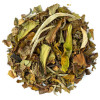Rare white tea from the Fuding region in China














Discover Pai Mu Tan, a delicacy born in China's Fujian province, where white tea buds are hand-picked each spring. From certified organic farming, this exceptional tea, also known as "White Peony", is withered and dried according to traditional methods, thus preserving all the purity of its leaves. When brewed, its subtle floral and ripe fruit aromas bloom in a cup with light apricot notes. With its low theine content, it's perfect for enjoying throughout the day, offering a delicate and refreshing sensory experience. Let yourself be seduced by this refined tea with natural benefits, rich in antioxidants, and dive into a journey through authentic Chinese flavors.
Preparation Instructions

Steeping time
1.5-2 min

Brewing temperature
70-80°C

Time of day
All day

Dosage
12-15g / L
In our workshop in Provence, each blend is handcrafted with passion by our team.
Real pieces of dried fruit, whole plants and carefully selected teas of origin.
Carefully crafted to create unforgettable tasting moments. A signature taste, an authentic experience.